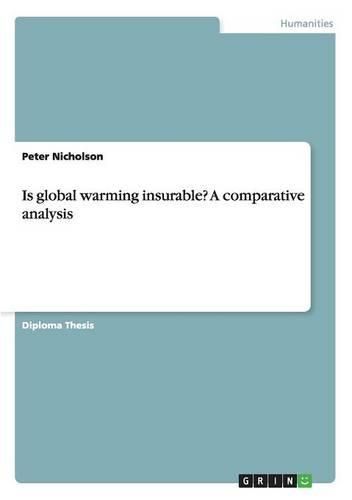Readings Newsletter
Become a Readings Member to make your shopping experience even easier.
Sign in or sign up for free!
You’re not far away from qualifying for FREE standard shipping within Australia
You’ve qualified for FREE standard shipping within Australia
The cart is loading…






Diploma Thesis from the year 2010 in the subject Sociology - Miscellaneous, Bielefeld University, language: English, abstract: The institution of insurance as it is known today has been largely neglected by sociologists, even though it is the central institution, alongside government, responsible for risk management (Ericson et al 2003: 44). A central focus of risk management is the protection of society from damage caused by natural hazards. This thesis aims to frame insurance and other institutions involved with risk management into a particular viewpoint of social problems. Natural hazards constitute the largest shore of the market for insurance while at the same time pose the largest challenge for the institution. One may question why this is so. Well into the 21st century anthropogenic climate change or global warming is no longer merely a theory, it has become reality. International reinsurers, scientists and politicians agree that anthropogenic CO2 and other gases are increasing the temperature on earth. Consequentially natural hazards are increasing in frequency and impact (Munich Re 2009). This poses problems for societies dealing with impacts from natural hazards. Much research has been done on individual behavior in deciding whether or not to insure against natural hazards (Kunreuther 2004; Kerjan 2008a; Grace 2006). This line of research views individual as myopic in assessing risk, thereby underestimating risk and the relevance of insurance. The emphasis of this research is mostly on the irrationality of individuals as regards the benefits of insurance. This perspective fails to take into account the influence of societal institutions on individual decisions; for example, whether or not to insure against disasters. Theoretical exercises in this direction are common, whereas attempts to consider the environment of a specific risk management system are rare. Michael Huber’s observation (2004a) represents an exception as it describes the institutional a
$9.00 standard shipping within Australia
FREE standard shipping within Australia for orders over $100.00
Express & International shipping calculated at checkout
Diploma Thesis from the year 2010 in the subject Sociology - Miscellaneous, Bielefeld University, language: English, abstract: The institution of insurance as it is known today has been largely neglected by sociologists, even though it is the central institution, alongside government, responsible for risk management (Ericson et al 2003: 44). A central focus of risk management is the protection of society from damage caused by natural hazards. This thesis aims to frame insurance and other institutions involved with risk management into a particular viewpoint of social problems. Natural hazards constitute the largest shore of the market for insurance while at the same time pose the largest challenge for the institution. One may question why this is so. Well into the 21st century anthropogenic climate change or global warming is no longer merely a theory, it has become reality. International reinsurers, scientists and politicians agree that anthropogenic CO2 and other gases are increasing the temperature on earth. Consequentially natural hazards are increasing in frequency and impact (Munich Re 2009). This poses problems for societies dealing with impacts from natural hazards. Much research has been done on individual behavior in deciding whether or not to insure against natural hazards (Kunreuther 2004; Kerjan 2008a; Grace 2006). This line of research views individual as myopic in assessing risk, thereby underestimating risk and the relevance of insurance. The emphasis of this research is mostly on the irrationality of individuals as regards the benefits of insurance. This perspective fails to take into account the influence of societal institutions on individual decisions; for example, whether or not to insure against disasters. Theoretical exercises in this direction are common, whereas attempts to consider the environment of a specific risk management system are rare. Michael Huber’s observation (2004a) represents an exception as it describes the institutional a